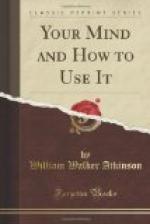A final aid in promoting increase of energy is that gained through stimulating ideas. Other things being equal, the student who is animated by a stimulating idea works more diligently and effectively than one without. The idea may be a lofty professional ideal; it may be a desire to please one’s family, a sense of duty, or a wish to excel. Whatever it is, an idea may stimulate to extraordinary achievements. Adopt some compelling aim if you have none. A vocational aim often serves as a powerful incentive throughout one’s student life. An idea may operate for even more transient purposes; it may make one oblivious to present discomfort to a remarkable degree. This is accomplished through the aid of suggestion. When feelings of fatigue approach, you may ward them off by resolutely suggesting to yourself that you are feeling fresh.
Above all, the will is effective in lifting one to higher levels of efficiency. It is notorious that a single effort of the will, “such as saying ‘no’ to some habitual temptation or performing some courageous act, will launch a man on a higher level of energy for days and weeks, will give him a new range of power. ’In the act of uncorking the whiskey bottle which I had brought home to get drunk upon,’ said a man to me, ’I suddenly found myself running out into the garden, where I smashed it on the ground. I felt so happy and uplifted after this act, that for two months I wasn’t tempted to touch a drop.’” But the results of exertions of the will are not usually so immediate, and you may accept it as a fact that in raising yourself to a higher level of energy you cannot do it by a single effort. Continuous effort is required until the higher levels of energy have formed the habit of responding when work is to be done. In laying the burden upon Nature’s mechanism of habit, you see you are again face to face with the proposition laid down at the beginning of the book—that education consists in the process of forming habits of mind. The particular habit most important to cultivate in connection with the production of second-wind is the habit of resisting fatigue. Form the habit of persisting in spite of apparent obstacles and limitations. Though they seem almost unsurmountable, they are really only superficial. Buried deep within you are stores of energy that you yourself are unaware of. They will assist you in accomplishing feats far greater than you think yourself capable of. Draw upon these resources and you will find yourself gradually living and working upon a higher plane of efficiency, improving the quality of your work, increasing the quantity of your work and enhancing your enjoyment in work.
READINGS AND EXERCISE
Readings: James (9) Seashore (14) Chapter III. Swift (20) Chapter V.
Exercise I. Describe conditions you have observed at time of second-wind in connection with prolonged (a) physical exertion, (b) intellectual exertion.




